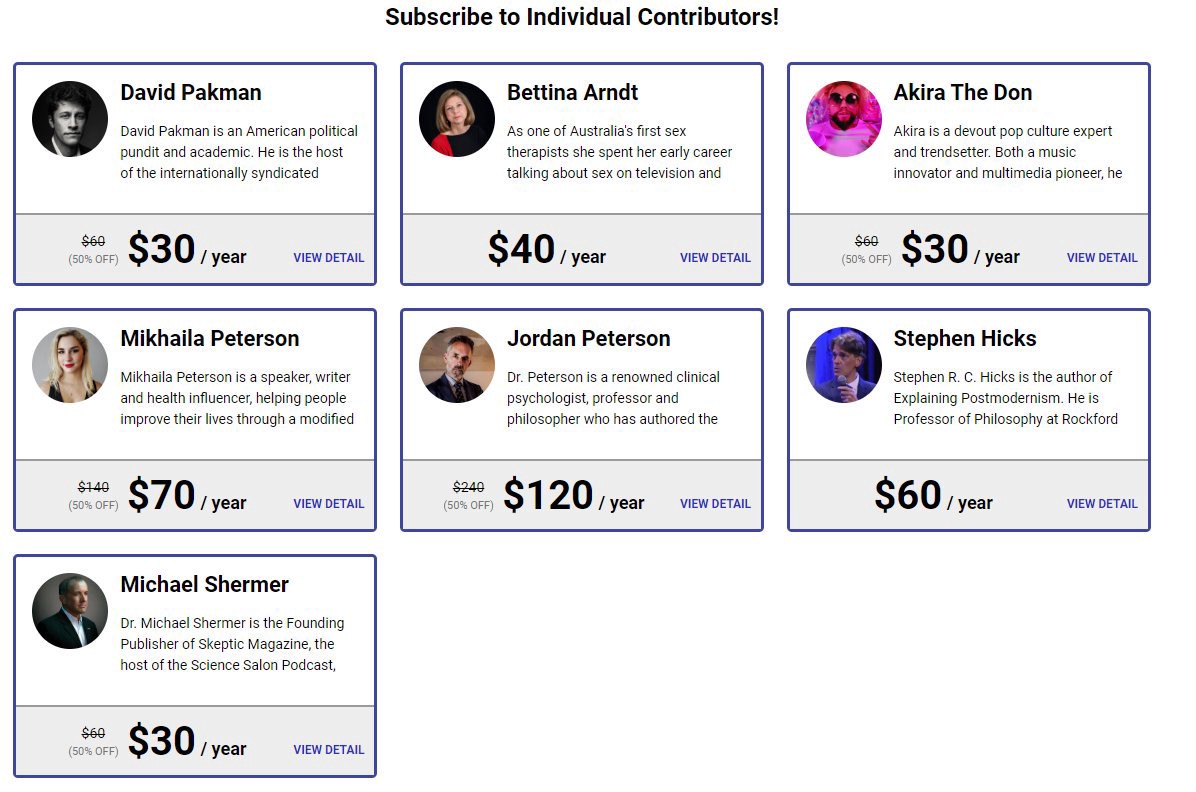The ?anti-censorship? social media platform represents the poor execution of a fatally flawed premise.
 ( Gage Skidmore / CC-BY-SA 2.0)
( Gage Skidmore / CC-BY-SA 2.0)
Over the summer, there was a buzz among conservatives over Jordan Peterson?s announcement that he planned to launch an a new ?anti-censorship? social media platform. Thinkspot would be a cross between Twitter and Patreon, enabling contributors to monetize their content through user subscriptions. Peterson vowed that the platform wouldn?t remove posts unless it was ordered by a court to do so.
The whole idea is problematic, considering the history of other platforms built around the idea of free speech absolutism. Gab became a haven for neo-Nazi refugees from Twitter, while 8chan lost its domain after it became the go-to spot for posting genocidal manifestos.
How much free speech is too much?
Why the First Amendment shouldn?t be the guideline for managing speech online
medium.com
However, there?s a difference between Thinkspot and these other sites. It?s appropriately marketed as ?anti-censorship? rather than ?free speech? because, strictly speaking, Thinkspot is not a place for everyone from all points along the political spectrum to dialogue freely.
Though Thinkspot is still in a closed beta phase, it?s clear that Peterson has his thumb on the scale. The word ?curated? is used a lot. So while the platform might stay true to its word that it will never remove content unless ordered, it will amplify certain voices over others.
Thinkspot?s selection of beta users offers a few hints as to what kind of ?curated? content the platform will offer. While there are a few token liberals like David Pakman, beta users are mostly from the fringe right or ?radical center.? One of the earliest beta users was Carl Benjamin?aka Sargon of Akkad?a UKIP member who was kicked off Twitter for joking about raping a Labour MP.
Other hand-selected beta users include an assortment of Intellectual Dark Web (IDW) grifters, Quillette writers?and at least one ?race realist? Youtuber with ties to Neo-Nazis.
Jean-Francois Gariepy, who was recently invited to join the platform, vlogs about racist pseudoscience on Youtube, and his channel frequently features white nationalists, such as David Duke, Greg Johnson, Mike Enoch and Richard Spencer. As someone who produces far-right content and could be deplatformed at any moment, Gariepy is potentially the ideal consumer for the the service Thinkspot offers.
One problem: He hates the platform.
Gariepy did a brief review on Twitter when he got access to Thinkspot earlier this month. He is one of the only beta testers to actually present any sort of opinion about his experience, and it?s mostly negative. In its current incarnation, Thinkspot is basically pay to play.
On Thinkspot, speech is anything but ?free.? It costs $2.50 a month just to be a contributor. Everything is paywalled on the site, which is to say you have to pay a subscription fee before you can access feeds of people you like. The most expensive subscriptions just happen to be Peterson ($120/year) and his daughter ($70/year). Most of the rest also happen to have some kind of personal relationship with Peterson.
 (Twitter)
(Twitter)
Gariepy recommended people get on Gab for a better ?free speech? experience. Tellingly, he made that statement on Twitter for the simple reason that no one likes using Gab?not even Nazis. (Gariepy uses Twitter more than three times as often himself.)
There?s a catch-22 here. ?Curating? the content of Thinkspot is necessary to keep it from devolving into a neo-Nazi sewer like Gab did, but in doing so they alienate the primary group of people that might be in the market for an ?anti-censorship? speech platform.
What the far-right really needs is a replacement for ill-fated Patreon alternatives, like Hatreon and GoyFundMe, and many were pinning their hopes on Thinkspot. However, if Peterson provides that he might find his service losing its payment processing just like those sites did because?as it turns out?financing Nazis is a bad business move.
Many of Thinkspot?s features betray a cluelessness about what makes social media platforms successful, which is to be expected when the site?s founder doesn?t really understand or like social media. For example, instead of a 240-character maximum, posts have a 50-word minimum, which is ostensibly meant to encourage deeper, more thoughtful expression.
This seems to stem from Peterson?s personal preferences and experience. He provoked a lot of outrage from his conservative fans when he tweeted out: ?Bret Kavanaugh should resign if confirmed.? He responded to the controversy in a blog post in which he said: ?It was an error for me to use Twitter to express such thoughts, particularly in the condensed form that Twitter requires.?
He went on to say, ?I think it would be safer for me to leave Twitter and it would almost certainly better for my mental health and ease of mind and conscience.? In other words, Peterson no longer feels safe in this space because he encountered harsh criticism there from people whose politics are broadly aligned with his.
In Thinkspot, Peterson gets to be the all-powerful mayor of Idea Town. It has a feature similar to the voting system on Reddit, where posts get hidden if they get a certain ratio of downvotes. This is at odds with the spirit of Thinkspot, as summarized by Mikhaila Peterson: ?We?re in desperate need for a platform that doesn?t arbitrarily decide to throw people off because of random crowd mentality.?
The stated reason why Thinkspot is necessary is that tech companies ?kowtow to progressive mobs and continue to silence conservative voices,? in the words of a writer for the libertarian Foundation for Economic Education. But all Thinkspot does is create a space where conservative mobs are the ones empowered to do the silencing.
The conventional wisdom of business is that one should create the broadest consumer base possible. The Nazis don?t seem too keen on using it, and the left certainly won?t, so what does that leave? A handful of IDW grifters, libertarians and the type of weirdos who think Laura Loomer is cool.
Peterson has created a user experience no one likes and a service no one needs. Thinkspot is like a group of nerds in the lunchroom unilaterally deciding that wherever they are sitting at is the cool table.
To get the full Thinkspot experience for free, just save your $2.50 and go watch a bunch of Jordan Peterson videos on Youtube, then hang out in the discussion section of Reason Magazine.


